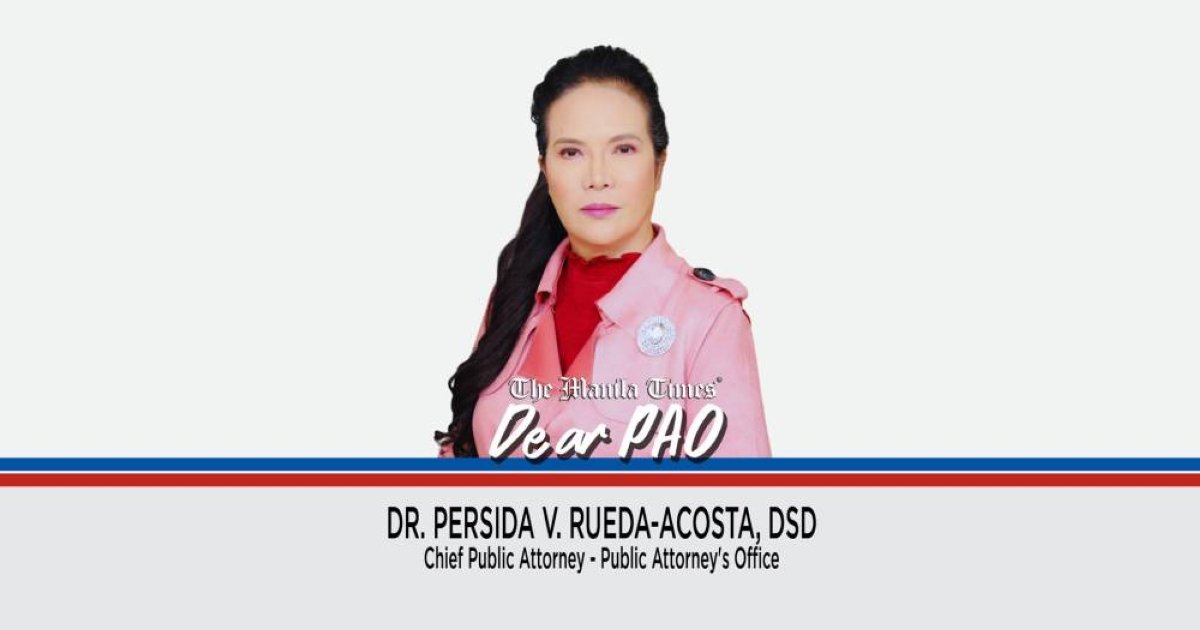Dear PAO,
I have a problem regarding my land, which is also being claimed by my neighbor. I am now contemplating on filing a suit against my neighbor and have already talked to several lawyers who have asked for an acceptance fee. I am willing to pay the said fee, but I would like to know if I can demand a refund, assuming I terminate the services of that lawyer. What is the purpose of this kind of fee?
Monson
Dear Monson,

In general, the fees to be collected by lawyers must be in consonance with Section 41, Canon III of Administrative Matter 22-09-01-SC, dated April 11, 2023, or the Code of Professional Responsibility and Accountability (CPRA), issued by the Supreme Court, which states that:
“Section 41. Fair and reasonable fees. – A lawyer shall charge only fair and reasonable fees.
“Attorney’s fees shall be deemed fair and reasonable if determined based on the following factors:
“(a) The time spent and the extent of the service rendered or required;
“(b) The novelty and difficulty of the issues involved;
“(c) The skill or expertise of the lawyer, including the level of study and experience required for the engagement;
“(d) The probability of losing other engagements as a result of acceptance of the case;
“(e) The customary charges for similar services and the recommended schedule of fees, which the IBP chapter shall provide;
“(f) The quantitative or qualitative value of the client’s interest in the engagement, or the benefits resulting to the client from the service;
“(g) The contingency or certainty of compensation;
“(h) The character of the engagement, whether limited, seasonal, or otherwise; and
“(i) Other analogous factors.”
Thus, attorney’s fees and other fees may be charged by the lawyer. Other fees include the acceptance fee, which may be imposed by mere acceptance of the case. The difference between the attorney’s fee and acceptance fee was succinctly explained in the case of Ignacio vs. Alviar, AC 11482, July 17, 2017, where the Supreme Court, through Associate Justice Noel Tijam, stated that:
“As regards the restitution of the acceptance fees, We find it necessary to first distinguish between an attorney’s fee and an acceptance fee as the former depends on the nature and extent of the legal services rendered, while the other does not.
“On one hand, attorney’s fee is understood both in its ordinary and extraordinary concept. In its ordinary concept, attorney’s fee refers to the reasonable compensation paid to a lawyer by his client for legal services rendered. xxx.
“On the other hand, acceptance fee refers to the charge imposed by the lawyer for mere acceptance of the case. The rationale for the fee is because once the lawyer agrees to represent a client, he is precluded from handling cases of the opposing party based on the prohibition on conflict of interest. The opportunity cost of mere acceptance is thus indemnified by the payment of acceptance fee. However, since acceptance fee compensates the lawyer only for lost opportunity, the same is not measured by the nature and extent of the legal services rendered.”
The Supreme Court went further in the same case and enumerated the instances where acceptance fee may be refunded:
“Be that as it may, the Court had not shied from ordering a return of acceptance fees in cases wherein the lawyer had been negligent in the handling of his client’s case. Thus, in Carino v. Atty. De Los Reyes, the respondent lawyer who failed to file a complaint-affidavit before the prosecutor’s office, returned the PhP10,000 acceptance fee paid to him and was admonished to be more careful in the performance of his duty to his clients. Likewise, in Voluntad-Ramirez v. Baustista, the respondent lawyer was ordered to return the PhP14,000 acceptance fee because he did nothing to advance his client’s cause during the six-month period that he was engaged as counsel.
“This being the case, the next query to be had is how much of the acceptance fee should respondent restitute. In this regard, the principle of quantum meruit (as much as he deserves) may serve as a basis for determining the reasonable amount of attorney’s fees. Quantum meruit is a device to prevent undue enrichment based on the equitable postulate that it is unjust for a person to retain benefit without working for it.”
Applying the above-quoted decision in your situation, the acceptance fee is a charge for the mere acceptance of the case. Its purpose is to indemnify your lawyer for the loss of opportunity to represent the opposing party once he or she accepts your case due to the prohibition of conflict of interest. As a rule, the acceptance fee is non-refundable as it is not based on the nature and extent of the legal services provided. However, if your lawyer is negligent in handling your case, the acceptance fee you paid may be refunded to you, although a reasonable amount may be deducted to compensate your lawyer for the services he or she rendered based on the principle of quantum meruit.
We hope that we were able to answer your queries. Please be reminded that this advice is based solely on the facts you have narrated and our appreciation of the same. Our opinion may vary when other facts are changed or elaborated on.
Editor’s note: Dear PAO is a daily column of the Public Attorney’s Office. Questions for Chief Acosta may be sent to [email protected]










